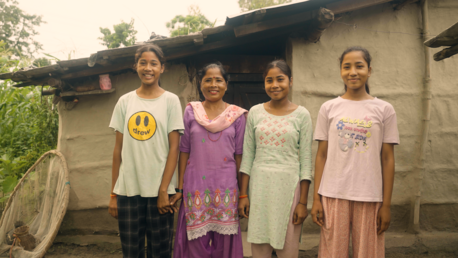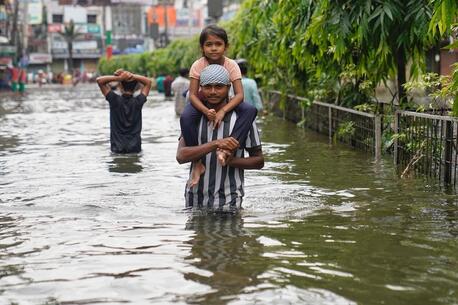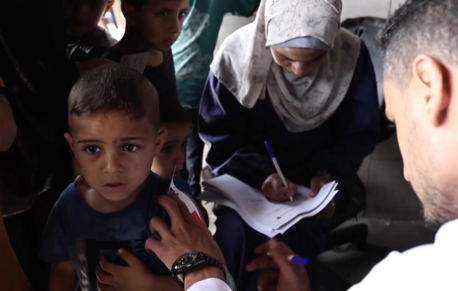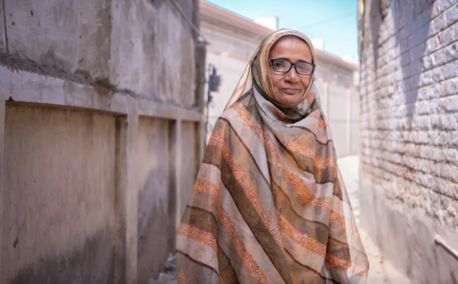
Pakistan's Unsung Heroes of Community Health
"Lady Health Workers" bring vital health care services to remote and underserved communities in Pakistan, with support from UNICEF and the Church of Jesus Christ of Latter-day Saints.
A network of trained health workers provide basic first aid and health care guidance for families in suburban and rural communities
Hyderabad, Pakistan: It’s 3:00 in the afternoon and there’s a knock at 43-year-old Farida Husain’s back door in Qasimabad township. Above the door, a sign reads "Health House." Farida opens the door to her neighbor, Afshan, a young mother of two, who arrives with her older daughter, 18-month-old Alisha, who she says is feverish.
Farida is a Lady Health Worker (LHW), an essential part of suburban and rural communities in Pakistan. Owing to cultural sensitivities and the limited access to primary health care in remote areas, District Health Offices have established a network of women like Farida who reside in these communities as LHWs. These selected health workers receive training in basic first aid and health care guidance. They conduct community-based health interventions, which include registering community members, particularly women and children, for services like family planning, maternal and child health care, immunization and health promotion.
After greeting Afshan, who recently had another baby, Farida asks her about her post-partum health and the baby’s immunization. She then pulls out her UNICEF-provided health kit. After sanitizing her hands and putting on gloves, she checks the toddler's temperature with a digital thermometer. She retrieves an infant weighing scale and her special measuring tape, which is used to assess mid-upper arm circumference, a critical metric for identifying malnutrition in children aged 6 months to 5 years.
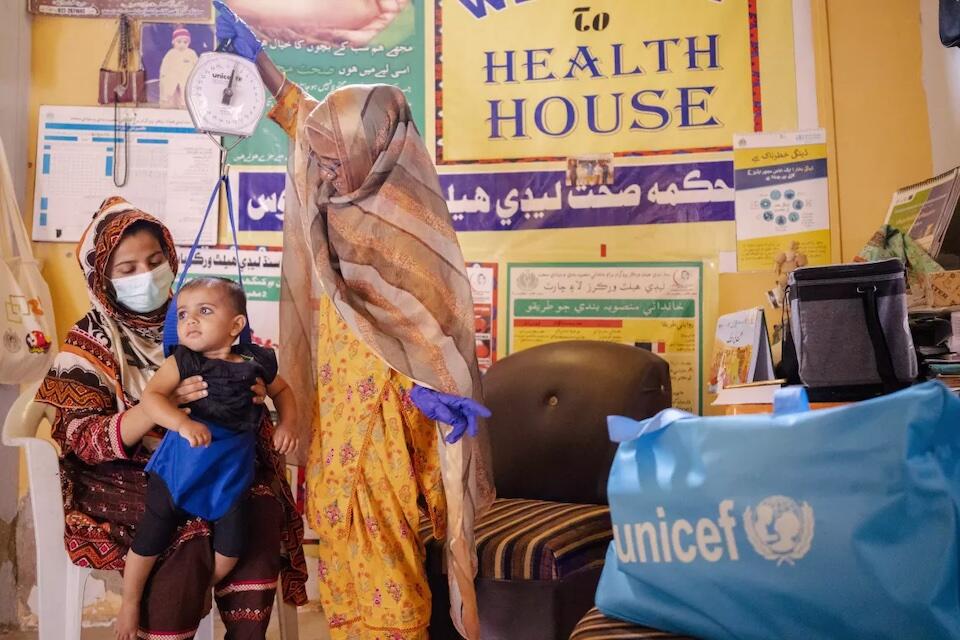
Community-based LHWs make monthly house calls, with a focus on the well-being of pregnant women, mothers and children under 5
Farida usually makes house calls in the community. Within the privacy of their homes, women are more comfortable discussing their health issues. She follows a monthly schedule for her community rounds, covering nearly 1,500 households. Her daily visits are planned to ensure she can visit every household within the month. Her primary focus revolves around the well-being of pregnant women, mothers and children under the age of 5. However, since she lives in the community, her job requires her to be available throughout the week for any family medical emergency.
"Sometimes, families approach me with an injured child, and I provide them with initial first aid treatment for their wounds," shares Farida. While she can handle basic first aid and general health care advice, any serious issue requires referral to the nearest hospital or health clinic with a qualified doctor.
"I often accompany pregnant women for their deliveries or arrange vaccination for the children in the area," she adds.
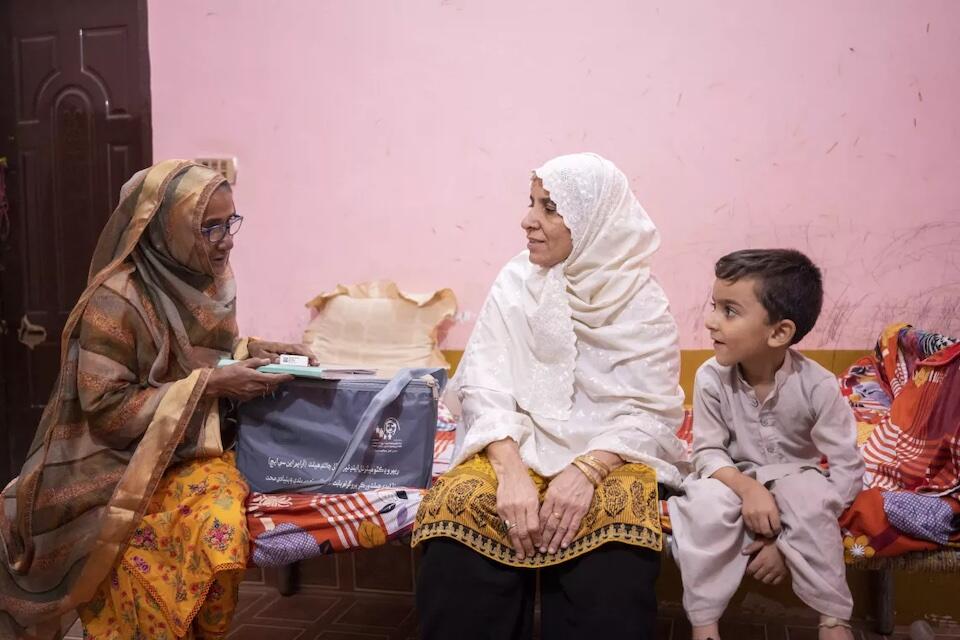
LHWs provided health care for families displaced by massive flooding in 2022
Immediately after the devastating floods of 2022, a large number of internally displaced people sought refuge in her district’s public school buildings. Farida and other LHWs performed their duties there as well. She shared their pain, as Farida herself was impacted by the floods.
“I’m grateful that my own house remained intact despite being inundated with floodwater. Some of my kit supplies were damaged and initially, I couldn’t go for house calls because our streets were flooded.” Fortunately, her town recovered faster than remote areas within the province.
“We take part in people’s joys and sadness. I feel good by serving others because these children are my children,” shares Farida.
We take part in people's joys and sadness. I feel good by serving others because these children are my children ... Our work is crucial because we spread valuable awareness to those who can't easily access good health care.
As a 20-year veteran, Farida is well-respected in the community. She can navigate sensitive topics like family planning and reproductive health care with married couples, offering them condoms from her kit or recommendations to visit a gynecologist to get birth control measures prescribed. After serving her community for many years, she feels a deep connection to them. With the additional household income, she has been able to educate her own children and help her son set up a mobile phone repair shop.
"Our work is crucial because we spread valuable awareness to those who can't easily access good health care," she says proudly.
Farida acknowledges that her job would not be possible without the LHW kit sent by the District Health Office, which includes about 25 items like first aid supplies, medicine for diarrhea and pneumonia, maternal care supplements, an awareness booklet, and basic birth control items.
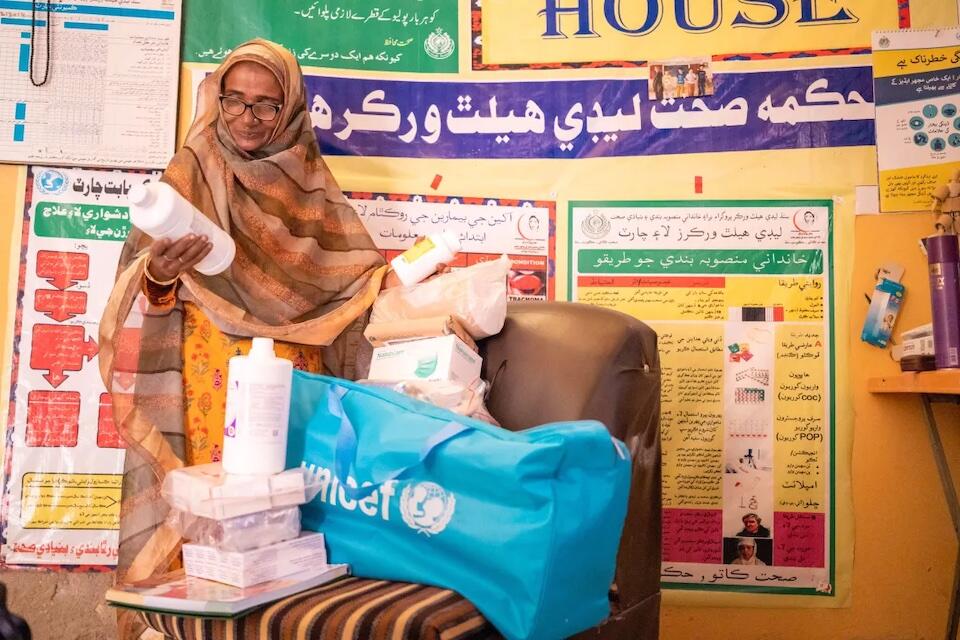
Financial support from the Church of Jesus Christ of Latter-day Saints helps UNICEF procure and distribute essential supplies to health workers
With financial support from the Church of Jesus Christ of Latter-day Saints, UNICEF Pakistan has provided health care workers with essential supplies to support services to a population of around 10,000 individuals in 37 flood-affected districts of Balochistan and Sindh provinces. While UNICEF used multiple funding sources to procure medicines, basic equipment and bags for the kits, the generous funding from the Church of Jesus Christ of Latter-day Saints contributed towards the procurement and distribution of these important kits. The funding also contributed towards the design and production of almost 2,500 weather-resilient health boards to be installed in front of the “LHW Houses” that are critical for community members for identification of the health house in the catchment area.
In addition, UNICEF has reached approximately 14,000 flood-affected people with safe drinking water through the rehabilitation of five water supply systems in southern Khyber Pakhtunkhwa Province with support from the Church of Jesus Christ of Latter-day Saints. UNICEF has also rehabilitated over 200 flood-damaged schools, increased enrollment at temporary learning centers and transitional school structures, and provided mental health support to teachers and parents in different flood-affected areas of Sindh, Balochistan and Punjab.
UNICEF works around the world to improve the health and well-being of children so they can grow up to reach their full potential. Your contribution can make a difference. Please donate.
This story is adapted from UNICEF.org
HOW TO HELP
There are many ways to make a difference
War, famine, poverty, natural disasters — threats to the world's children keep coming. But UNICEF won't stop working to keep children healthy and safe.
UNICEF works in over 190 countries and territories — more places than any other children's organization. UNICEF has the world's largest humanitarian warehouse and, when disaster strikes, can get supplies almost anywhere within 72 hours. Constantly innovating, always advocating for a better world for children, UNICEF works to ensure that every child can grow up healthy, educated, protected and respected.
Would you like to help give all children the opportunity to reach their full potential? There are many ways to get involved.



